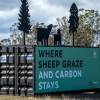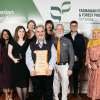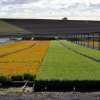
Why trees are integral to this farm's future
Posted 20 August 2021
Managing trees On-farm benefits Economic benefits and markets Carbon benefits Native regrowth forest management
The integration of trees and encouraging biodiversity makes perfect sense to the owners of this North-West dairy farm.
Integrating trees on farms is common sense, according to a North-West dairy farmer Matthew Gunningham.
Mr Gunningham's farm is one of seven demonstration sites featuring landscape-scale best practice of integration of shelterbelts and woodlots into the agricultural landscape.
The demonstration sites were funded by Private Forests Tasmania and the federal government through the Smart Farming Grant.
The PFT board, with Dairy Tasmania, visited Gunningham Farm to see the progress of the site.
Gunningham farm will include 17 hectares of Pinus radiata and 15 hectares of Eucalyptus nitens.
Mr Gunningham said planting trees had been a learning process and integral to ensuring biodiversity.
"As we have gone down the organic road, we're thinking more along the lines of greater diversity in the pasture, and we've added more diversity into the farm ecosystem, generally," Mr Gunningham said.
"It's going to be really important going forward. The idea of just farming monoculture, it doesn't make sense; it doesn't fit in with what nature does. We are trying to farm where paddocks all look the same and only one species in it – that just doesn't make sense. I really like the idea of mixing it up and having some diversity."
PFT chairman Evan Rolley said the demonstration site program wasn't about just getting trees planted but also working with landowners to ensure the right trees are planted in the right place for the landowner's benefit.
"The PFT board is a group of enthused, talented and optimistic Tasmanians who have expert knowledge in the forestry industry.
"What the PFT Board inspected at Gunningham’s is an example of the opportunities available to dairy farms to be a key part of expanded commercial tree planting that, through thought and purpose, can be integrated with successful commercial dairy operations."
Tasmania's Resources Minister Guy Barnett said Tasmanians should be proud of the state's world-leading and sustainable managed forestry sector.
"Australia's current timber shortage and the challenges it faces for the building and construction industry highlights the importance of a sustainable and productive forestry sector in Tasmania," he said.
"Three-quarters of all forestry production in Tasmania by volume now comes from private growers.
"In driving forward the work of PFT, we welcome the announcement that PFT chairman Evan Rolley has been appointed for a further two years and Jim Wilson has been appointed as a new PFT board member."
Mr Wilson recently joined the PFT board as a member representing industrial private growers.
Mr Wilson is passionate about the forest industry and is the plantation operations and services manager at Forico.
"Tasmania is one of the best places in the world to integrate trees and agriculture, providing the best agricultural outcomes, a climate change solution, and wood as the icing on the cake," Mr Wilson said.
"Private Forests Tasmania is an important enabler for growth in the state's forest sector. I'm looking forward to working with the PFT board."
Share this Article
Latest Articles
-

17 September 2025
Celebrating excellence at the Tasmanian Timber Awards
-

17 September 2025
Forest Practices Authority Research Update Day
-

13 August 2025
Have you seen our Stems for CO2 Project signage on the Midlands Highway?
Archives
- ActivAcre hits milestone, calls for more farmers to get on board
- Napier's leading the way in sustainable forestry and carbon-neutral farming
- Sound science needed to assess carbon impacts of timber harvesting
- Newly appointed TFFPN Board of Directors
- Graduate Certificate of Forestry Scholarship
- Forestry Australia Mentoring Program 2025
- Forest Industry Roundtable planning for the long term
- Eagle Management Constraint Period extended
- Successful private native forest management celebrated
- $15 million investment in new ship loader to boost Bell Bay's forestry exports
- Standing with Tasmania's forestry industry: buy local
- TFPA: Tasmanian Freight Equalisation Scheme needs a ground-up review
- AFCA Gala Dinner celebrates industry excellence
- Fire permits now required Statewide
- Forest leaders hone skills in sustainable native regrowth management
- Tasmanian forests and the carbon market: Barriers and opportunities
- Spring is the time for fuel reduction burning
- Primed for Growth: A situation analysis of the Tasmanian Forest and Wood Products Sector
- Audit requirements cut for low-risk plantation projects
- Guidance and support for landowners after damaging winds
- Forestry Australia welcomes further definition of active forest management
- Farm & Forest Mapper Tool highlighted at Rural Youth Tasmania's Young Farmer of the Year competition
- Senate Select Committee inquiry into the Tasmanian Freight Equalisation Scheme
- Timberlink announces new wood composite products brand
- Newly developed protocol a vital tool for safeguarding forestry industry
- Red Hot Tips: Fire management for Tassie farmers
- Bioenergy: Fuelling industries with trees
- Harvesting trees: What you need to know
- Shelterbelts: How are they contributing to farm systems?
- Infill plantings and remnant vegetation: Why biodiversity depends on a thriving understory
- Plantation planning: The key to a successful plantation
- Exciting interactive forestry knowledge hub launched
- $450,000 farm forestry grant recipients revealed



